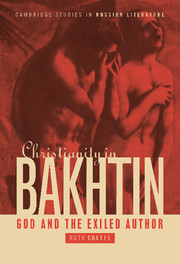Book contents
- Frontmatter
- Contents
- Acknowledgements
- List of abbreviations
- Note on translation and citation
- Chapter 1 Introduction
- Chapter 2 Fall and Incarnation in ‘Towards a Philosophy of the Act’
- Chapter 3 The aesthetic gospel of ‘Author and Hero in Aesthetic Activity’
- Chapter 4 Was Bakhtin a Marxist?: The work of the Bakhtin Circle, 1924–1929
- Chapter 5 Falling silent: the critical aesthetic of Problems of Dostoevsky's Creative Work
- Chapter 6 The exiled author: ‘Discourse in the Novel’ and beyond
- Chapter 7 Christian motifs in Bakhtin's carnival writings
- Chapter 8 The fate of Christian motifs in Bakhtin's work
- Notes
- Bibliography
- Index
- CAMBRIDGE STUDIES IN RUSSIAN LITERATURE
Chapter 5 - Falling silent: the critical aesthetic of Problems of Dostoevsky's Creative Work
Published online by Cambridge University Press: 22 September 2009
- Frontmatter
- Contents
- Acknowledgements
- List of abbreviations
- Note on translation and citation
- Chapter 1 Introduction
- Chapter 2 Fall and Incarnation in ‘Towards a Philosophy of the Act’
- Chapter 3 The aesthetic gospel of ‘Author and Hero in Aesthetic Activity’
- Chapter 4 Was Bakhtin a Marxist?: The work of the Bakhtin Circle, 1924–1929
- Chapter 5 Falling silent: the critical aesthetic of Problems of Dostoevsky's Creative Work
- Chapter 6 The exiled author: ‘Discourse in the Novel’ and beyond
- Chapter 7 Christian motifs in Bakhtin's carnival writings
- Chapter 8 The fate of Christian motifs in Bakhtin's work
- Notes
- Bibliography
- Index
- CAMBRIDGE STUDIES IN RUSSIAN LITERATURE
Summary
In my discussion of ‘Author and Hero’ I sought to demonstrate the existence of a coherent theistic framework to Bakhtin's aesthetic theory which underlies his understanding of creativity and, specifically, authorship. To recap, key elements of this framework include the radical and ineradicable difference between the levels on which author and hero exist (the transgredient ‘outsidedness’ of the author), the characterisation of aesthetic creativity as self-sacrificial and active as opposed to the receptive passivity of the created hero, and the understanding of authorial activity as redemptional, the gracious (because motivated only by love) salvation of the fragmented and repentant hero through the gift of form. The resulting picture is as harmonious as it is, however, prescriptive. Bakhtin, in his attempt to apply his model to various types of novel (the precursor of his several later typologies), is ineluctably drawn to discuss divergent constructions of the author/hero relation in terms of the degree to which they deviate from the norm, that is to say, critically.
With respect to the contextualisation of Problems of Dostoevsky's Creative Work (1929) it is illuminating to note what 'Author and Hero's ‘redemption’ model of the author leads Bakhtin to conclude about Dostoevsky. He is an example of an author who ‘loses [his] axiological point of outsidedness to the hero’ (‘Author and Hero’, 18).
- Type
- Chapter
- Information
- Christianity in BakhtinGod and the Exiled Author, pp. 84 - 102Publisher: Cambridge University PressPrint publication year: 1999



